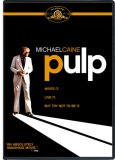| Reviews & Columns |
|
Reviews DVD TV on DVD Blu-ray 4K UHD International DVDs In Theaters Reviews by Studio Video Games Features Collector Series DVDs Easter Egg Database Interviews DVD Talk Radio Feature Articles Columns Anime Talk DVD Savant Horror DVDs The M.O.D. Squad Art House HD Talk Silent DVD
|
DVD Talk Forum |
|
|
| Resources |
|
DVD Price Search Customer Service #'s RCE Info Links |
|
Columns
|
|
|
Pulp
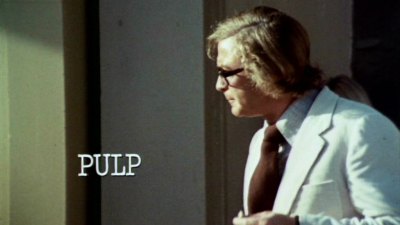
Caine (in full 1972 regalia, including carefully combed shag haircut, blue-tinted glasses and white safari suit) plays Mickey King, a former funeral parlor operator who left his wife and family back in England to become a pulp fiction writer, based in Malta. Writing under the current nom de plume Guy Strange (he was also Gary Rough, Dan Wild, Les Behan, Susan Eager, Paul S. Cumming, O. R. Gann, and S. Odomi), Mickey has just delivered his latest pulp opus, The Organ-Grinder to his publisher, Marcovic (Leopoldo Trieste). While at Marcovic's office, Mickey meets Benny Dinuccio (Lionel Stander), the "public relations" man for a mysterious dying stranger who's willing to pay Mickey big money to ghostwrite his memoirs. Agreeing to the strange request, Mickey accepts the even stranger conditions of the contract that include his riding on a five day bus coach trip, where a contact man will give Mickey further instructions about the book.
While on the bus, Mickey meets Miller (Al Lettieri), an English instructor from Berkeley who's a fan of Mickey's work. Taking him to be the contact man, Mickey, after a mix-up in his hotel room at their next stop, visits Miller in his room, only to find him knifed in his bathtub. The next day, Mickey expects the police, but none come, and the hotel clerk tells Mickey that Miller checked out that very morning. Smelling a rat, Mickey continues on with the tour, where at Zonk's Temple he meets his real contact, Liz Adams (Nadia Cassini). After Liz tells Mickey about his mysterious client, they immediately make out, and walk a few steps over to a car where Benny waits for them (so much for the need of a contact). On the way to a private island, Mickey learns about his employer, Preston Gilbert (Mickey Rooney, in a sensational performance), an aging ex-movie star with real-life ties to the Mafia.
After meeting Preston, who's never given up his obnoxious star behavior (he berates his employees and denigrates Liz in front of everybody), Mickey learns that Preston has been dodging Miller the assassin, who has a contract out on him. Mickey is suspicious of the deal, but as with everything in his life, he's willing to go along with the whole set-up. After a week of non-stop talking to Mickey about his life, Preston invites Mickey to an after-book party, where Preston, after performing a particularly humiliating shtick where he embarrasses a couple dining nearby, is gunned down by the miraculously alive Miller, disguised as a priest. The gun is turned on Mickey, as well, but he escapes unharmed. Learning from Benny that Preston was involved in some old scandal, and that that person may be targeting Mickey, thinking that Preston spilled the beans to Mickey during their book discussions, Mickey must now turn into one of his own pulp detectives to find out what happened to Preston, and to stop his killer from bringing him down, as well.
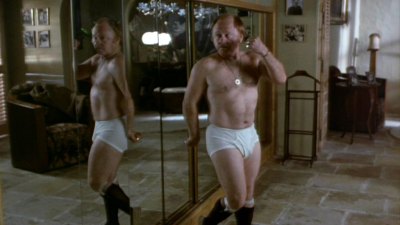
Watching Pulp at first, you get the feeling this wooly little flick might be no more than a clever, witty, but slight comedy of opposition. The film's most obvious gimmick is having Caine deliver a litany of cliched pulp observations about the events that are happening on the screen, with the joke being that the film events are far more prosaic than his narration. That might work for a ten minutes or so, but Hodges very cleverly allows Pulp to actually become a legitimate film noir, so that the very structure and design of the film, which succeeds as parody, also works as an example of the genre being parodied.
Caine, the seemingly hapless pulp writer, is in fact the perfect embodiment of the noir hero in cinema. Passive and accepting of his fate at the beginning of Pulp, (like a young Robert Mitchum in Out of the Past or Burt Lancaster in The Killers), Caine offers no objection to going along for a ride he knows is phony from the start. But he's also deadpan and cool under obvious pressure (when he discovers Miller's supposedly dead body), like Bogart's Sam Spade. And in the third act, when it becomes more than just a game for Caine to find the killer, and he discovers a crime that wakes him from his fantasy world and shakes his sense of right and wrong, Caine takes on the moralistic stature of an avenging Philip Marlowe. Far from the dupe who makes silly jokes in the narration (as many critics at the time took the character), Caine's Mickey King is a bona fide, complex combination of noir victim and hero.
Director Hodges makes sure to populate the rest of the film with noir archetypes, as well, including the devastating femme fatales Liz Adams (who amusingly doesn't lead Caine to any kind of danger) and Princess Betty Cippola (noir icon Lizabeth Scott), a sexy devourer of men whose connection to her politician husband (who's also involved in the mysterious Preston scandal) nicely links the frequent noir concept of absolute corruption of politics and the frequent connection between office holders and murder. And Rooney's Preston Gilbert, the ex-actor (weren't so many noir heroes "ex-someones"?) with ties to the Mafia, has the frequently featured noir personality quirks of implied impotence and subsequent explosive rage that figured in many noir bad guy victims.
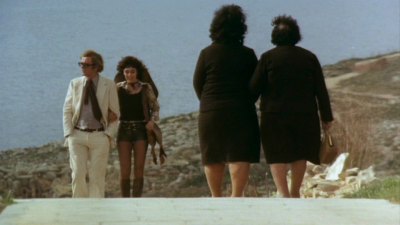
As for the structure of the film, it's admirably noir, with a complex, often baffling plot that exists solely to confuse the viewer, and keep them on edge. The frequently nonsensical plotting, along with red herring characters sprinkled throughout the increasingly ridiculous (and deadly) situations - such as the "Mysterious Englishman" (Dennis Price), who insults Texans, eats only vegetables, and who spouts Lewis Carroll at the drop of a hat - exists not to be solved, but to discombobulate the viewer (I love it when the passengers on the bus take over the narration from Caine, proving that everyone has been infected with his pulp sensibilities and cliches). This allows Hodges the opportunity to develop the most delicately parodistic tone to the proceedings, while indulging in frequent visual puns and gags. Mirrors are everywhere in Pulp, another frequent noir motif, and often Hodges places them within the frame for comedic effect (at the beginning of the film, a taxi hilariously smashes into a full length mirror out in the street), encouraging us to never trust our initial perceptions of the frame. Odd visual quirks are everywhere, including twins, out-of-place nuns, a police line-up consisting only of priests, a supporting character played by Robert Sacchi, the Bogart look-alike, and a group of political supporters whose placards spell out "F*&#" as a comment on the proceedings.
Perhaps the critics and audiences were expecting Hodges' and Caine's Pulp to be the same kind of hard-edged, grim crime meller, like their previous Get Carter. Perhaps the delicate tone of parody was lost to most viewers who were waylaid by the complex plot and the quirky characters. Without a background in film noir, Pulp could very well come off as diffused and routine to the casual viewer, particularly back in 1972, when most average movie patrons would have been hard-pressed to define film noir. Get Carter is rightly famous after over thirty years of cult interest; it's time for Pulp to come into its own, as well.
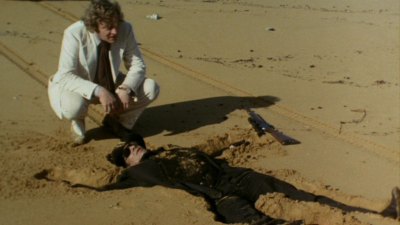
The DVD:
The Video:
The widescreen, 1.78:1 video image for Pulp looks better than you've ever seen it before. If the image looks distressed and grainy at times, that's the look of the original materials, not the DVD transfer.
The Audio:
You can choose either the original English mono mix, or a new Dolby Digital English 2.0 stereo mix for Pulp. Occasionally muddy sound is again from the original mix, not the DVD transfer. A Spanish mono track is also available. Subtitles are available in English and French, and close-caption is also available.
The Extras:
Criminally, there are zero extras for Pulp -- not even the original trailer.
Final Thoughts:
Twisted film noir parody, and yet legitimate film noir mystery, Pulp pulls off the neat trick of being a perfect example of the kind of film it's also parodying. Michael Caine, Mickey Rooney and Lionel Stander give standout performances, and writer/director Michael Hodges keeps the visuals tricks and witty, obtuse one-liners coming. A real find for newcomers, and a welcome return for fans, Pulp is as good as it gets for film noir and affectionate, knowing film parody. I highly recommend Pulp.
Paul Mavis is an internationally published film and television historian, a member of the Online Film Critics Society, and the author of The Espionage Filmography.


|
| Popular Reviews |
| Sponsored Links |
|
|
| Sponsored Links |
|
|
| Release List | Reviews | Shop | Newsletter | Forum | DVD Giveaways | Blu-Ray | Advertise |
|
Copyright 2024 DVDTalk.com All Rights Reserved. Legal Info, Privacy Policy, Terms of Use,
Manage Preferences,
Your Privacy Choices | |||||||









